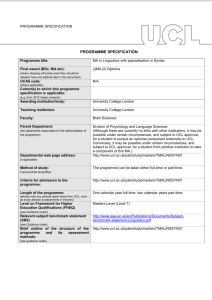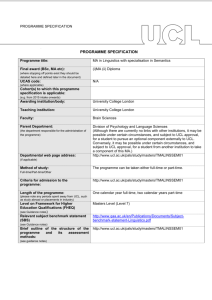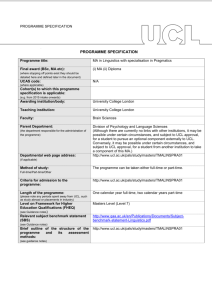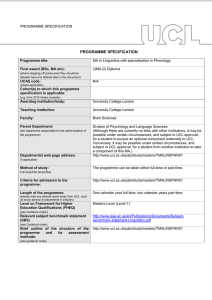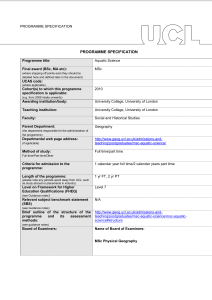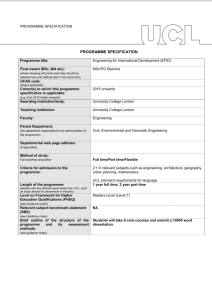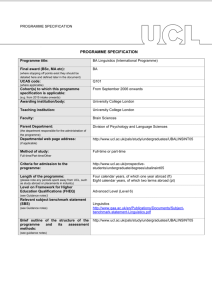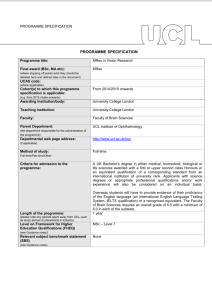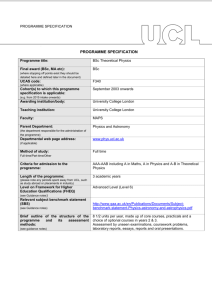MA/Postgraduate Diploma Linguistics
advertisement
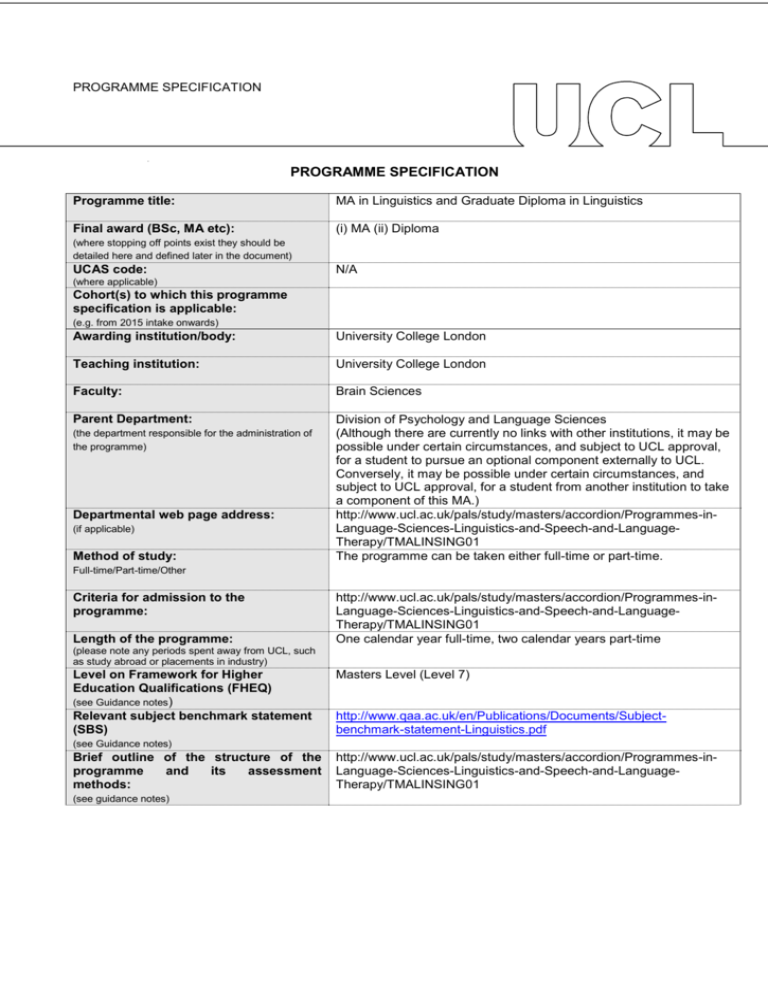
PROGRAMME SPECIFICATION PROGRAMME SPECIFICATION Programme title: MA in Linguistics and Graduate Diploma in Linguistics Final award (BSc, MA etc): (i) MA (ii) Diploma (where stopping off points exist they should be detailed here and defined later in the document) UCAS code: N/A (where applicable) Cohort(s) to which this programme specification is applicable: (e.g. from 2015 intake onwards) Awarding institution/body: University College London Teaching institution: University College London Faculty: Brain Sciences Parent Department: Division of Psychology and Language Sciences (Although there are currently no links with other institutions, it may be possible under certain circumstances, and subject to UCL approval, for a student to pursue an optional component externally to UCL. Conversely, it may be possible under certain circumstances, and subject to UCL approval, for a student from another institution to take a component of this MA.) http://www.ucl.ac.uk/pals/study/masters/accordion/Programmes-inLanguage-Sciences-Linguistics-and-Speech-and-LanguageTherapy/TMALINSING01 The programme can be taken either full-time or part-time. (the department responsible for the administration of the programme) Departmental web page address: (if applicable) Method of study: Full-time/Part-time/Other Criteria for admission to the programme: Length of the programme: http://www.ucl.ac.uk/pals/study/masters/accordion/Programmes-inLanguage-Sciences-Linguistics-and-Speech-and-LanguageTherapy/TMALINSING01 One calendar year full-time, two calendar years part-time (please note any periods spent away from UCL, such as study abroad or placements in industry) Level on Framework for Higher Education Qualifications (FHEQ) (see Guidance notes) Relevant subject benchmark statement (SBS) Masters Level (Level 7) http://www.qaa.ac.uk/en/Publications/Documents/Subjectbenchmark-statement-Linguistics.pdf (see Guidance notes) Brief outline of the structure of the programme and its assessment methods: (see guidance notes) http://www.ucl.ac.uk/pals/study/masters/accordion/Programmes-inLanguage-Sciences-Linguistics-and-Speech-and-LanguageTherapy/TMALINSING01 Board of Examiners: Name of Board of Examiners: Linguistics and Phonetics Combined Board (PLINGCBE) Professional body accreditation (if applicable): N/A Date of next scheduled accreditation visit: EDUCATIONAL AIMS OF THE PROGRAMME: The programme aims to develop the student's knowledge and understanding of current research in theoretical linguistics and to prepare the student for independent research in this area. On completion of the programme, the student will be able to formulate appropriate research questions, to find and evaluate relevant literature by accessing the wide range of information sources available to academic scholarship, to develop and test new hypotheses, and to produce cogent, structured and professionally presented reports. PROGRAMME OUTCOMES: The programme provides opportunities for students to develop and demonstrate knowledge and understanding, qualities, skills and other attributes in the following areas: A: Knowledge and understanding Knowledge and understanding of: 1 current issues in theoretical linguistics 2 the key questions that drive current research in syntax, phonetics & phonology and semantics & pragmatics 3 how the various components of human language interact with each other and with other systems of the mind 4 methods and concepts of linguistic analysis Teaching/learning methods and strategies: Foundational issues are in all introductory courses (1, 3, 4 and especially 2). All further teaching is based on current research by linguists internal and external to the department (1, 2 and 4), with emphasis on the nature of research questions (2) and how to evaluate relevant literature (4). The interaction of the various components of human language with each other and with other systems of the mind is a fundamental issue in much current research and will feature prominently in all courses (3). [MA only:] Students will be required to carry out a smallscale but serious research project, under intensive supervision. This will enhance their knowledge and understanding of research methods (4). Assessment: Learning outcomes for 1-4 will be assessed through a combination of examinations, essays and [MA only:] a dissertation. B: Skills and other attributes Intellectual (thinking) skills: - able to: 1 reason critically 2 identify a problem 3 pose a cogent research question 4 exercise independence of thought 5 present a linguistic hypothesis and mount systematic and logical arguments for and against it 6 analyse syntactic, phonological, and semantic structures and manipulate the appropriate symbolic representational systems Teaching/learning methods and strategies: Intellectual skills are developed through the teaching and learning programme. Each course, whatever its format, involves discussion of key issues, practice in applying concepts, both orally and in writing, analysis and interpretation of material, critical evaluation of linguistic hypotheses and individual feedback for learners on work produced. Assessment: The assessments employed (exams, essays and dissertation) all place great emphasis on the students' ability to demonstrate the skills in 1-6, either through the production of coherent responses to problems set in an examination or through the demonstration of the ability to sustain systematic and logical arguments for or against a linguistic hypothesis in an essay or [MA only:] the dissertation. C: Skills and other attributes Practical skills (able to): 1 access the wide range of information sources available to academic scholarship, such as bibliographies, periodicals and on-line resources 2 produce cogent, structured and professionally presented reports 3 give a professional oral presentation 4 manage a project Teaching/learning methods and strategies: As students begin the process of 'mining' for information (which will start in term 1 and intensify in terms 2 and 3), they will be made familiar with various relevant information sources, including online resources, such as electronic abstracts services, archives and databases (1). The option components and [MA only:] the dissertation will require students to carry out small-scale but serious research projects, under intensive supervision (1 and 2). In the tutorial sessions, each student will be required to write a number of essays (on which detailed feedback is given) and give an oral presentation (3). [MA only]: The dissertation and its associated research work will give students the opportunity to learn about managing a larger project (4) and producing a wellstructured and professionally presented piece of work (2). Assessment: The oral presentations will not be assessed. Rather the emphasis here will be on practising in a familiar environment and giving formative feedback. Skills 1 and 2 will be an integral part of the assessment of essays and the dissertation. [MA only:] The student's ability to respond to feedback under supervision and manage a project (4) is an integral part of the assessment of the dissertation. D: Skills and other attributes Transferable skills (able to): 1 communicate effectively 2 present ideas orally and visually 3 use a computer as an investigative tool 4 listen actively 5 take initiative and demonstrate a proactive approach 6 act with independence Teaching/learning methods and strategies: In each course, whatever its format, students will participate in the discussion of key issues (1, 2, 4 and 5). The supervision of student research work will be aimed at increasing the student's ability to carry out research independently (5 and 6), to use computers as a research tool (3) and to present ideas orally and visually (2). The intensive supervision of essay and [MA only:]dissertation work will provide students with a high level of feedback. Assessment: These skills are assessed as an integral component of students' written work, both in exams and in essays and [MA only:] the dissertation. The following reference points were used in designing the programme: the Framework for Higher Education Qualifications: (http://www.qaa.ac.uk/en/Publications/Documents/Framework-Higher-Education-Qualifications-08.pdf); the relevant Subject Benchmark Statements (http://www.qaa.ac.uk/en/Publications/Documents/Subjectbenchmark-statement-Linguistics.pdf) the programme specifications for UCL degree programmes in relevant subjects (where applicable); UCL teaching and learning policies; staff research. Please note: This specification provides a concise summary of the main features of the programme and the learning outcomes that a typical student might reasonably be expected to achieve and demonstrate if he/she takes full advantage of the learning opportunities that are provided. Current students can find more detailed information on the learning outcomes, content and teaching, learning and assessment methods of each course unit/module at http://moodle.ucl.ac.uk/course/view.php?id=1922. The accuracy of the information contained in this document is reviewed annually by UCL and may be checked by the Quality Assurance Agency. Programme Organiser(s) Dr Richard Breheny Name(s): Date of Production: 28 January 2010 Date of Review: 15 September 2014 Date approved by Head of Department: 22 September 2014 Date approved by Chair of Departmental Teaching Committee: Date approved by Faculty Teaching Committee October 2014 November 2014
